For close to a half-century, Chapel Haven has been recognized as one of the premier programs of its kind, teaching adults with cognitive and social disabilities to live independent and fulfilling lives.
But even those dedicated to making the main Westville campus everything it can be knew that something – actually, a lot – was missing.
The staff knew, the residents knew, Chapel Haven’s president and other executives knew.
“Back in 2010, when I was appointed president, while I was so happy with that honor, when I took my first stroll and looked around the campus I said, ‘Uh-oh,’ ” Chapel Haven President Michael Storz recalls.
“I had inherited a building and a campus that were outdated,” Storz explains. “I quickly saw that we had aging residents that we didn’t have the ability to take care of as they grew older, and their needs were changing. So our older, more senior residents were being forced to leave Chapel Haven and all the friends they had made here because we didn’t have proper medical facilities to care for them, among many other things.”
“It just ripped my heart out,” he recalls. “People who lived here felt this was their home and wanted to live the rest of their lives here. But they were being forced to leave the place they had grown to love.”
“Now,” Storz proudly says, “we will be able to provide that loving home forever for our residents, and for their families. Nobody will have to leave if they want to stay. And most do want to stay.”
While Storz takes great pride in describing what the future holds for Chapel Haven, a resident put it more succinctly.
“It’s time for us to be in real buildings,” says Robbie Marcus, who has lived at Chapel Haven for two years. “I’m really excited and looking forward to all the new, cool stuff. I’m tired of the old, stinky stuff.”
The new “cool stuff” is part of a $70 million major expansion that includes the construction of several new buildings on the Westville campus in New Haven, which is close to Woodbridge.
Phase 1 recently was finished: a new, 32,500-square-foot residential and classroom campus to house Chapel Haven’s REACH (Residential Education at Chapel Haven) program. The program serves adults with profiles including autism, mild intellectual disabilities and Down Syndrome.
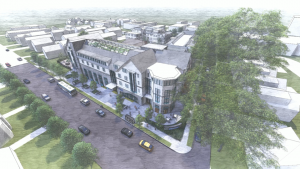
A new Welcome Center, also part of Phase 1, serves as the new gateway to the campus. Designed by The S/L/A/M Collaborative, it includes a curved glass lobby and reception space, with an inviting stone hearth and seating area. A gallery featuring artwork by the residents leads into a multimedia presentation and conference room.
This fall marks the beginning of Phase 2, when construction will begin on a four-story residential community offering apartments, clinical space and community services. It has been designed as an intergenerational space where adults with disabilities will not only receive the support they need but can thrive in a beautiful, non-institutional setting.
Founded in 1972 in a small house on Chapel Street, Chapel Haven is a nationally accredited transitional living program and approved private special education school. It moved in 1976 to its current Whalley Avenue location and has become a cornerstone of the neighborhood.
Its stated mission is: “Chapel Haven provides lifelong individualized services for people with developmental and social disabilities, empowering them to live independent and self-determined lives.”
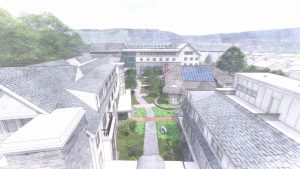
Chapel Haven has grown to serve more than 250 adults (18 years of age and older) in the residence. It also serves the community with three distinct programs; REACH, Asperger’s Syndrome Adult Transition (ASAT), and Chapel Haven West (located in Tucson, AZ).
Through the REACH program, students learn academics like math, social studies and language arts, along with “the day-to-day living skills that will be necessary for independent living when they graduate from the two-year residential program and become members of our Supported Living Program,” according to the Chapel Haven website. These include household skills (i.e. cooking, cleaning and shopping), dealing with finances, managing health and hygiene, and getting along with a roommate. Chapel Haven also has an evening and weekend recreation program offering some 35 activities a month, ranging from a night at the movies to chaperoned trips to New York and Boston.
New Haven Mayor Toni Harp is as excited as the Chapel Haven staff and residents about the expansion project.
“I wholeheartedly congratulate them on this state-of-the-art facility providing services for seniors, allowing them to continue living among friends and with independence,” says the mayor. “There are very few aging services or facilities of this kind in the country, so once again, this positions Chapel Haven as a national leader in providing these services.”
Also excited about the expansion is Chapel Haven board Chairwoman Peggy Baker, whose 27-year-old son Matt is a resident of Chapel Haven, having graduated from the REACH program. He now lives independently in a condominium on nearby Fountain Street.
Matt has a mild form of autism, says Baker. He has been at Chapel Haven for seven years.
“The new expansion project means as a parent, I know Matt can stay forever, long after my husband and I are gone, and his siblings don’t have to worry about what comes next for Matt,” she says.
“He just loves Chapel Haven. Frankly, he doesn’t want to come home for overnights,” she says jokingly. “We have to force him to come home. It is just a wonderful school, a wonderful place.”
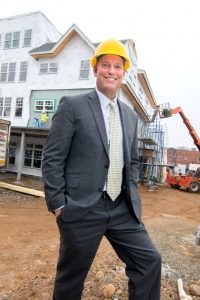
Baker says one aspect of the expansion project that shouldn’t be forgotten is that the buildings will benefit the broader Westville area.
“It’ll be as much as an asset to the community, with the athletic facilities and the community rooms, as it will be to Chapel Haven,” she says.
David Neal of S/L/A/M says that the company held many meetings about the construction plans, and the architects made sure to include residents of Chapel Haven in the meetings.
“We wanted their ideas, their thoughts on what worked for them, and what didn’t,” says Neal.
Bill Angier, a teacher in the REACH program, couldn’t be more excited about opening the new school year in a state-of-the-art complex with all the bells and whistles.
“I think it’s a fantastic opportunity that I walked into,” says Angier. “I just started teaching here last year, and to think that my first year was the last year in the old building and my second year will be the first in the new one – well, I just love that idea.”
The task of paying for the expansion project is a big one, and a lot of that responsibility falls on Vice President of Development Julia Isenberg.
“We’ve received tremendous support from the community and families of those who reside at Chapel Haven,” says Isenberg. She says the fundraising has topped about half of the necessary $70 million, but both she and Storz say they will, one way or another, raise every dollar necessary.
And all of that money is coming from donations.
Storz fondly recalls a meeting when Chapel Haven residents first heard about the expansion plans.
“Many had tears in their eyes because they were so excited,” he remembers. “One resident even wrote his own check for $234 because he wanted to help in any way he could.”
Storz says one other aspect of the expansion project that gives him a lot of satisfaction is that all the buildings will be accessible to everyone.
He says one of the toughest things Chapel Haven staff had to do in the past was to tell people using wheelchairs that Chapel Haven buildings weren’t up to code for their use.
“People would understandably assume that, considering our stated mission, Chapel Haven was a place that would be would be wheelchair accessible,” says Storz. “Now we are.”
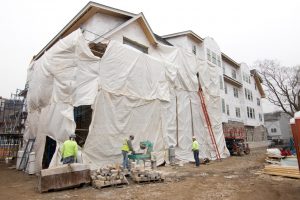
One of the first residents with a wheelchair who will be moving into the new Chapel Haven is Andrew Burbank, who is in his early 20s. He has had cerebral palsy since birth and has been in a motorized wheelchair since age three.
“He’s always wanted to live on his own,” says his mother, Kris Burbank. “He’s been living at home with personal caregivers who help him with his dressing and bathing. He is so looking forward, as any young person his age would, to living on his own.”
Andrew Burbank is enrolled in the REACH program.
“I just think it’s such a terrific thing,” Kris Burbank continues. “Yes, the new buildings are wonderful. But Chapel Haven is so much more than buildings. It is an outlook, an attitude and enabling people to live independently. The buildings just help fulfill the overall goal of what the place and its people are all about.”
Photography by Tony Bacewicz



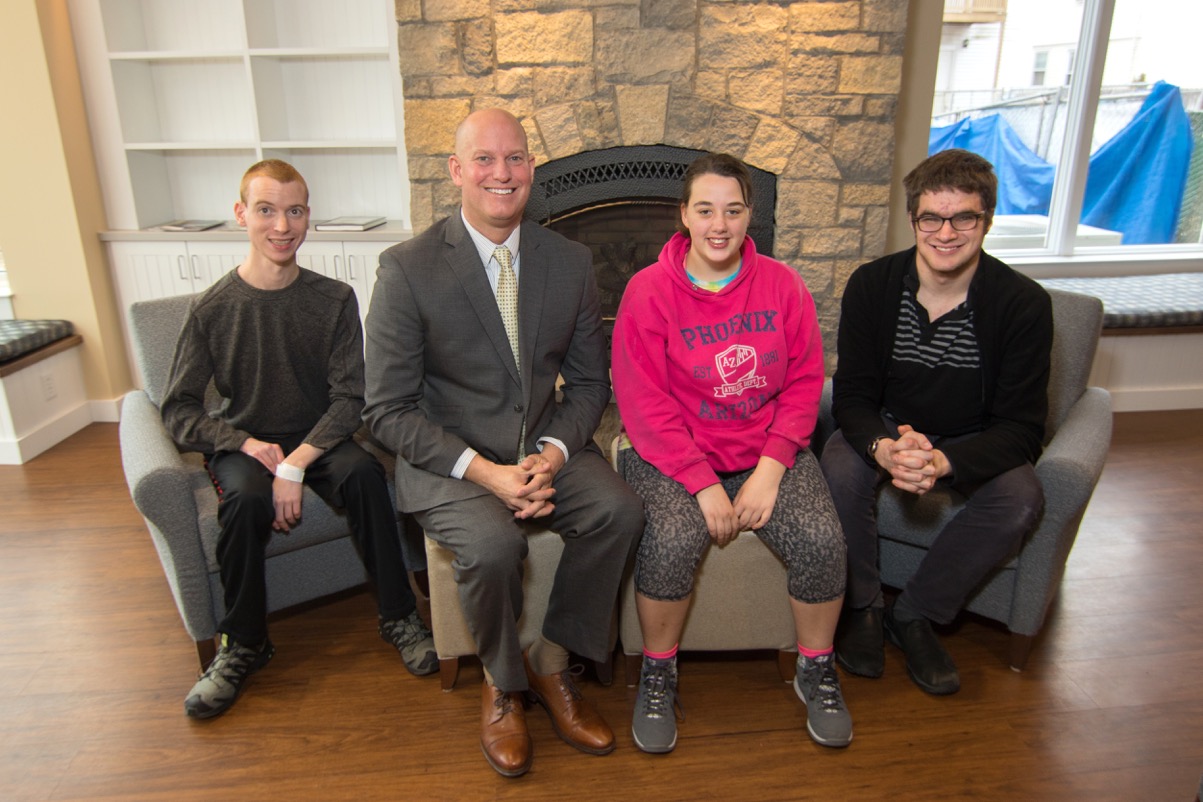




More Stories
Hospital for Special Care’s Ivan Lendl Adaptive Sports Camp
Special Olympics Connecticut: Supporting and Inspiring a Special Community
Healing Meals: Supporting Nourishment During a Health Crisis and Beyond